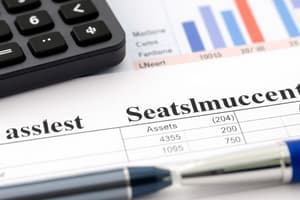Podcast
Questions and Answers
What can be considered as assets in accounting?
What can be considered as assets in accounting?
- Liabilities that reduce a company's financial health
- Items that are expected to be consumed within a year
- Resources owned by a company that contribute to generating revenue (correct)
- Assets are not related to economic benefits
Which of the following is an example of a non-current asset?
Which of the following is an example of a non-current asset?
- Property, plant, and equipment (correct)
- Accounts Receivable
- Inventory
- Prepaid expenses
How are assets classified in accounting?
How are assets classified in accounting?
- Into tangible and intangible assets
- As liabilities and equity
- As current and non-current assets (correct)
- As operational and non-operational assets
What is the valuation principle related to assets in accounting?
What is the valuation principle related to assets in accounting?
Which of the following is not an example of a current asset?
Which of the following is not an example of a current asset?
What is the main difference between current assets and non-current assets?
What is the main difference between current assets and non-current assets?
What is the principle that states assets are recorded at their historical cost?
What is the principle that states assets are recorded at their historical cost?
How are non-current assets typically spread over their useful life in accounting?
How are non-current assets typically spread over their useful life in accounting?
On which financial statement are assets reported?
On which financial statement are assets reported?
In accounting, what does the balance sheet ensure regarding assets, liabilities, and equity?
In accounting, what does the balance sheet ensure regarding assets, liabilities, and equity?
How are assets, like inventory, used in the income statement?
How are assets, like inventory, used in the income statement?
Why is understanding assets in accounting essential for stakeholders?
Why is understanding assets in accounting essential for stakeholders?
Flashcards are hidden until you start studying
Study Notes
Understanding Assets in Accounting
Accounting is a language of business, helping us make sense of the financial health of organizations. At the heart of this language lies the concept of assets, which can be thought of as the resources owned by a company that contribute to its ability to generate revenue and facilitate its operations.
What is an Asset?
An asset is an economic resource controlled by the entity that has the potential to be converted into future economic benefits. This definition encompasses a wide variety of resources, from tangible items like machinery and buildings to intangible resources like patents and goodwill.
Classification of Assets
Assets are often categorized into two main types: Current Assets and Non-Current Assets (also known as Fixed Assets).
- Current Assets are expected to be consumed or converted into cash within a year. Examples include cash, accounts receivable, inventory, and prepaid expenses.
- Non-Current Assets (Fixed Assets) are expected to be consumed or provide benefits over a period greater than a year. Examples include property, plant, and equipment, intangible assets like patents and trademarks, and investment properties.
Accounting for Assets
Accounting for assets involves several key concepts and principles.
- Valuation: Assets are recorded at their fair market value, which is the price at which they could be bought or sold in a competitive market under normal conditions.
- Cost Principle: Assets are recorded at their historical cost, which is the original price paid for the asset.
- Depreciation: Non-current assets are typically depreciated or amortized over their useful life, which helps to spread the cost of the asset over its useful life.
Accounting for Assets in Financial Statements
Assets are reported on the balance sheet, which is a financial statement that provides a snapshot of the company's financial position at a specific moment in time. Assets are reported on the left side of the balance sheet, and their values are usually matched with their respective liabilities and equity (right side) to ensure that assets equal liabilities plus equity.
The income statement, another key financial statement, is used to report the results of operations over a specific period. Assets, such as inventory, are used in the calculation of the cost of goods sold (COGS), which is an essential component of the income statement.
Conclusion
Understanding assets in accounting is a fundamental step towards gaining a solid grasp on the financial health of any organization. Assets provide a window into a company's ability to generate revenue and sustain its operations, allowing investors, managers, and other stakeholders to make informed decisions about the organization's future prospects. By applying principles of valuation, cost, and depreciation when accounting for assets, accountants help to ensure that the financial statements accurately reflect the company's financial position and operating results.
Studying That Suits You
Use AI to generate personalized quizzes and flashcards to suit your learning preferences.




